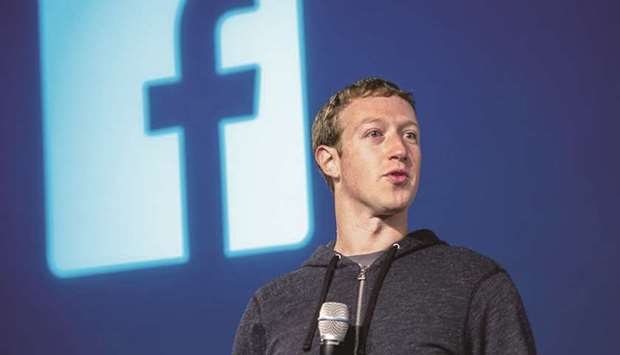Back in 2004 when ‘Hey Ya!’ was still topping the charts, young Mark Zuckerberg, the 19-year-old sophomore, and his Harvard roommates unleashed TheFacebook.com. Within 24 hours of the launch of this dorm room project, the social network had more than 1,000 users.
In the sesqui decade that followed, that sliver has expanded far beyond anyone’s expectations, including Zuckerberg’s. In its most recent earnings update, Facebook had 2.3 billion monthly active users, transforming from a website for poking your college crush to, arguably, the largest director of human attention in our species’ history.
Love it or hate it, Zuckerberg’s creation has forever changed how people connect across communities and culture, how businesses make money and how politicians seize power. Facebook is where people announce their engagements, babies, or even divorces and where state-sponsored trolls wage cyberwar against other countries. Facebook is how millions of NGOs collect donations and how hate-mongers rally their followers to kill people. It is also arguably the largest repository of personal information about humankind to ever exist.
As you’d expect from the world’s most popular social media site, Facebook has interesting factoids, and more than a few trivia tidbits that can be brought out to impress friends over a coffee.
TheFacebook.com didn’t become Facebook.com until Zuckerberg purchased the domain for $200,000 in 2005. The company wouldn’t acquire its shorter URL, fb.com, until 2011, when it bought it from, of all places, the American Farm Bureau Federation. The deal cost the social network a whopping $8.5 million.
Yahoo offered $1 billion to buy Facebook in September 2006 but Zuckerberg turned it down. “I don’t know what I could do with the money,” Zuckerberg reportedly said. In September 2009, almost five years since the site launched, Facebook turned profit for the first time.
There’s a reason behind Facebook’s blue colour scheme. Mark Zuckerberg suffers from red-green colour-blindness. It certainly doesn’t hurt that blue is also strongly associated with trust and security, two concepts essential in getting people to voluntarily part with their personal information.
Facebook’s ‘Like’ button used to be the ‘Awesome’ button. This was vetoed by Zuckerberg in 2007. Simply sharing aspects of our lives wasn’t enough. The ‘Like’ button fed human beings’ constant craving for validation by turning every post into a popularity contest. ‘Likes’ came to drive corporate decision making. They became informal poll tests for politicians.
Mark Zuckerburg, CEO of Facebook, calls himself a ‘Harvard Graduate’ when in fact he didn’t graduate (apparently his reply is that “there isn’t a setting for dropout”)
The scale of Facebook’s early profits gave it the means to gobble up its competitions. It bought photo-sharing app Instagram in 2012, beloved of the trendier, younger and female audience. In 2014, it splashed out €16.6bn on WhatsApp, the closed social network used by families, clubs and neighbours for the kind of messages they prefer to keep off their more public Facebook pages.
Despite the scandals and subsequent #DeleteFacebook campaign, its revenue reached around $55 billion in 2018. The vast majority of that income is generated through advertising, with just $825mn generated from ‘payments and other fees’.
It’s hard to remember a time when the social network wasn’t ubiquitous. We do see people having more power, and there is a long-term trend reshaping society to be more open and accountable over time. As such, Facebook has been the subject of intense scrutiny following a number of data breaches and questions over user privacy. The social network has a job to do to win back public trust.
Welcome to ‘Nutty’s Infotainment. YAYS!’. And your time starts NOW!
Which company has its HQ at 1 Hacker Way, also known as 1601 Willow Road, at Menlo Park, California?
Facebook, Inc.
Prior to a major homepage redesign in 2007, Facebook’s front page used to feature a man’s face partly obscured with a fog of ones and zeros, the elementary components of digital media. Who was this mystery man?
Al Pacino.
“You Don’t Get To 500 Million Friends Without Making a Few Enemies” is part of theatrical release poster of which movie?
The Social Network. The film portrays the founding of Facebook and the resulting lawsuits.
What is claim to fame of Reta Watson of London, as far as Facebook is concerned?
At 103, she is the oldest Facebook user. If you think you are too old to use Facebook, think again!
Name the Internet-based social network, launched by one of the ‘Big Four’ in June 2011 in an attempt to challenge other social networks such as Facebook and Twitter. On April 2, 2019, it plans to stop offering its consumer version and will begin deleting the site.
Google+
Mutaz Essa Barshim won Qatar’s first silver medal in summer Olympics at the Rio 2016. Who won the first medal for Qatar at summer Olympic Games?
Mohammed Suleiman won bronze in Men’s 1500 metres at 1992 Barcelona Olympics.
The IAAF World Championships, commonly referred to as the World Championships in Athletics, is a biennial athletics event organised by the International Association of Athletics Federations (IAAF). London hosted the last edition in 2017. Which city will host the event this year from September 27?
Doha
In Welsh, February is sometimes known as “Y Mis Bach”. What does it mean?
Little month or short month
What flavour ice cream did Baskin-Robbins release in 1969 to commemorate America’s landing on the moon?
Lunar Cheesecake
Identify the below winner of the 1958 Nobel Prize in Literature who was born this day (February 10) in 1890. He started writing his most famous work in 1915 but did not finish it until 1956. It was banned in the then USSR for more than 30 years. Its movie version was directed by David Lean and received five Golden Globes and five Oscars.
(Answer next week. Answer to last week’s photo-quiz: Woody Allen)

A DECADE AN A HALF: Back in 2004 when Hey Ya! was still topping the charts, young Mark Zuckerberg, the 19-year-old sophomore, and his Harvard roommates unleashed TheFacebook.com.
